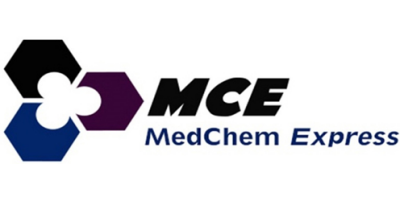

- Home
- Companies
- MedChemExpress LLC (MCE)
- Products
- MedChemExpress - Model Decanoic acid - ...
MedChemExpress - Model Decanoic acid - 334-48-5
Decanoic acid is a key component of the medium-chain triglyceride (MCT) found in coconut oil. Decanoic acid is a brain-penetrant and non-competitive inhibitor of AMPA receptor showing antiseizure activity in rats. Decanoic acid reduces tyrosinase activity and inhibits melanosome maturation. Decanoic acid suppresses the phosphorylation of c-Met and induced apoptosis in hepatocellular carcinoma (HCC) cells by inhibiting the expression of various oncogenic proteins, which is promising for research in the field of mTORC1 signaling, HCC and epilepsy[1][2][3].MCE products for research use only. We do not sell to patients.
Decanoic acid
MCE China:Decanoic acid
Brand:MedChemExpress (MCE)
Cat. No.HY-W015309
CAS:334-48-5
Purity:98.0%
Storage:Store at room temperature 3 years In solvent -80°C 2 years -20°C 1 year
Shipping:Room temperature in continental US; may vary elsewhere.
Description:Decanoic acid is a key component of the medium-chain triglyceride (MCT) found in coconut oil. Decanoic acid is a brain-penetrant and non-competitive inhibitor of AMPA receptor showing antiseizure activity in rats. Decanoic acid reduces tyrosinase activity and inhibits melanosome maturation. Decanoic acid suppresses the phosphorylation of c-Met and induced apoptosis in hepatocellular carcinoma (HCC) cells by inhibiting the expression of various oncogenic proteins, which is promising for research in the field of mTORC1 signaling, HCC and epilepsy.
In Vitro:Decanoic acid (60 μM, 1 h or 24 h) targets mTORC1 independent of PI3K/AKT, AMPK signaling and inhibits mTORC1 without altering mTORC2 activation , also reduces Ddp97 activity in Dictyostelium[1]. Decanoic acid (300 μM, 24 h) decreases the ratio of p-4E-BP1/total-4E-BP1 and p-S6K/total-S6K to reduce mTORC1 activity in patient-derived astrocytes with tuberous sclerosis complex[1]. Decanoic acid (80 μM, 2 h 30 min) reduces the cell viability, suppresses hepatocyte growth factor (HGF)-induced c-Met phosphorylation in both HCCLM3 and HepG2 cells[2]. Decanoic acid (80 μM, 24 h) triggers apoptosis in HCCLM3, HepG2 and HGF-induced cells[2]. Decanoic acid (0.3 mM or 1 mM, perfuse, 40 min) is a broad spectrum AMPA receptor inhibitor in a subunit dependent, non-competitive and voltage dependent manner in oocytes expressing a homomeric (GluA1 subunit) and heteromeric (GluA1/2 and GluA2/3) AMPA receptors[3].
In Vivo:Decanoic acid (100 μM and 300 μM, 1 h) significantly decreases plasma PTH concentration and decreases Cyp24a1 expression in the kidney at higher flow rates. Additionally, Decanoic acid exerts no change in p-AKT(Thr308)/total-AKT or p-AKT(Ser473)/total-AKT in both Dictyostelium and rat hippocampal slices[1]. Decanoic acid (50 mg/kg, i.p., thrice a week for four weeks) effectively mitigates tumorigenesis without displaying toxicity in HCC mouse model[2].
IC50 & Target:Human Endogenous Metabolite
Hot selling product:LY2109761 | Fludarabine | Norepinephrine | Tucatinib | BzATP (triethylammonium salt) | Sinefungin | AP1867 | PLGA (50:50) | Avelumab | Luteolin
Trending products:Recombinant Proteins | Bioactive Screening Libraries | Natural Products | Fluorescent Dye | PROTAC | Isotope-Labeled Compounds | Oligonucleotides
References:
[1]. Boison D, et, al. New insights into the mechanisms of the ketogenic diet. Curr Opin Neurol. 2017 Apr;30(2):187-192. [Content Brief]
[2]. Warren EC, et al. Decanoic acid inhibits mTORC1 activity independent of glucose and insulin signaling[J]. Proc Natl Acad Sci U S A. 2020 Sep 22;117(38):23617-23625. [Content Brief]
[3]. Yang MH, et al. Decanoic Acid Exerts Its Anti-Tumor Effects via Targeting c-Met Signaling Cascades in Hepatocellular Carcinoma Model[J]. Cancers (Basel). 2023 Sep 22;15(19):4681. [Content Brief]
[4]. Chang P, et al. Seizure control by decanoic acid through direct AMPA receptor inhibition. Brain. 2016 Feb;139(Pt 2):431-43. [Content Brief]
[5]. Kim S, et, al. Selective production of decanoic acid from iterative reversal of β-oxidation pathway. Biotechnol Bioeng. 2018 May;115(5):1311-1320. [Content Brief]
Brand introduction:
• MCE (MedChemExpress) has a global exclusive compound library of more than 200 kinds, and we are committed to providing the most comprehensive range of high-quality small molecule active compounds for scientific research customers around the world;
• More than 50,000 highly selective inhibitors and agonists are involved in various popular signaling pathways and disease areas;
• The products cover a variety of recombinant proteins, peptides, commonly used kits, more PROTAC, ADC and other characteristic products, widely used in new drug research and development, life science and other scientific research projects;
• Provide virtual screening, ion channel screening, metabolomics analysis detection analysis, drug screening and other professional technical services;
• It has a professional experimental center and strict quality control and verification system;
• Provide LC/MS, NMR, HPLC, chiral analysis, elemental analysis and other quality inspection reports to ensure the high purity and high quality of products;
• The biological activity of the products has been verified by the experiments of customers in various countries;
• A variety of top journals such as Nature, Cell, Science and pharmaceutical patents have included the scientific research results of MCE customers;
• Our professional team tracks the latest pharmaceutical and life science research and provides you with the latest active compounds in the world;
• It has established long-term cooperation with the world's major pharmaceutical companies and well-known scientific research institutions。
